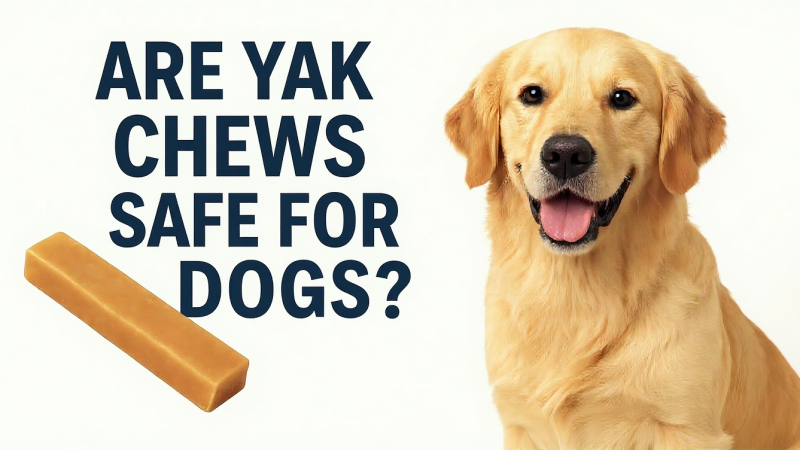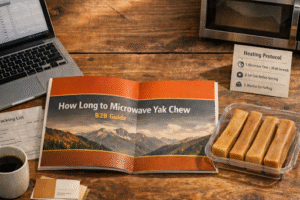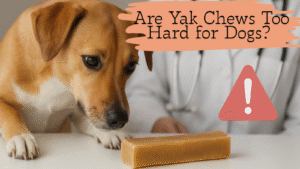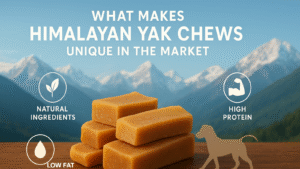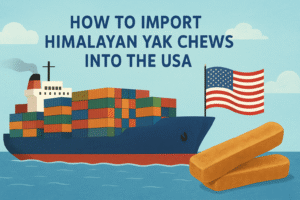So, you’ve probably seen those hard, bone-like chews around and wondered, “Are yak chews safe for dogs?” It’s a fair question, right? We all want to give our furry friends something they’ll enjoy, but not at the risk of their health. These yak milk chews, often called Himalayan chews, have become super popular, and for good reason. They’re made from natural stuff, supposedly last a while, and dogs seem to go crazy for them. But are they really as good as they seem? Let’s break down what goes into them, what to watch out for, and how to make sure your pup can enjoy them without any tummy troubles or worse.
Key Takeaways
- Yak milk chews are generally safe for dogs when given appropriately and supervised.
- They are made from natural ingredients like yak and cow milk, with no artificial additives.
- These chews can help clean teeth and provide protein and calcium, but moderation is key.
- Always choose the right size and hardness for your dog to prevent choking or dental issues.
- Supervise your dog while they chew and consult your vet if you have any concerns about digestion or allergies.
Understanding Yak Chews For Dogs

So, you’ve probably seen these yak chews popping up everywhere, right? They look pretty interesting, and a lot of dog owners are talking about them. They’re made from this really hard cheese that comes all the way from the Himalayas. It sounds a bit unusual, but there’s a reason they’ve become so popular. Let’s break down what exactly these chews are all about.
What Are Yak Milk Chews?
Basically, yak milk chews are a type of long-lasting dog treat. They’re traditionally made by people in the Himalayan regions using milk from yaks and sometimes cows. The process is pretty simple and has been around for ages. The milk is curdled, then pressed into blocks, and finally dried until it’s super hard. This natural hardening process is what gives them their unique, durable texture. They don’t usually have any added chemicals or preservatives, which is a big plus for many pet parents looking for more natural options.
The Natural Ingredients In Yak Chews
When you look at the ingredient list for a good quality yak chew, you’ll likely see just a few things: yak milk, cow milk, a little bit of salt, and lime juice. That’s it. No weird fillers, no artificial colors, and no flavors that you can’t pronounce. This simple recipe is a big part of why they’re considered a healthier alternative to some of the more processed dog treats out there. It’s pretty straightforward, which is nice.
Nutritional Benefits Of Yak Cheese For Dogs
These chews aren’t just for gnawing; they actually pack some nutritional punch. They’re a good source of protein, which is important for muscle development and overall body function in dogs. They also contain calcium, which is great for strong bones and healthy teeth. Plus, compared to many other cheese-based treats, yak chews are generally lower in fat. This makes them a pretty good option for dogs who need to watch their weight, as long as you’re not giving them too many.
Here’s a quick look at what they offer:
- Protein: Supports muscle health and energy levels.
- Calcium: Aids in bone strength and dental health.
- Low Fat: A good choice for weight-conscious dogs.
While they offer benefits, it’s always about moderation. Too much of a good thing can still lead to issues, so keep that in mind.
Are Yak Chews Safe For Dogs?
So, are those hard yak chews you’ve been seeing everywhere actually safe for your furry friend? The short answer is generally yes, but like most things with our pets, there are a few things to keep in mind. These chews are made from yak and cow milk, with just a bit of salt and lime juice. That means they’re pretty natural, without a lot of the artificial stuff that can sometimes cause problems for dogs. They’re also packed with protein and calcium, which is good for their muscles and bones, and they’re usually not too high in fat. This makes them a decent alternative to some of the more processed treats out there.
Digestibility Of Yak Chews
One of the big pluses for yak chews is how well dogs tend to digest them. Unlike some other hard chews that can sit in a dog’s stomach for ages or even cause blockages, yak milk chews usually break down pretty easily. This is because they’re made from simple, natural ingredients. So, if your dog happens to swallow a small piece, it’s less likely to cause a major digestive upset. However, it’s still important to watch them, because even digestible things can cause issues if too much is eaten at once.
Potential Risks And Precautions
While yak chews are generally safe, they aren’t completely risk-free. The biggest concerns usually revolve around choking and dental damage. If a dog chews a yak chew down to a small, hard nub, they might try to swallow it whole, which is a choking hazard. Also, because they are quite hard, there’s a small chance they could chip a tooth, especially if your dog is a really aggressive chewer or has existing dental problems. It’s always a good idea to pick a chew that’s the right size for your dog – not too small that it’s a choking risk, and not so big that they can’t manage it. You can even take the last little bit and puff it up with some hot water to make it soft and safe to finish. Remember, close supervision is key when introducing any new chew, and you can find some great hard Himalayan yak chews that are designed for durability.
When To Consult Your Veterinarian
Before you hand over a yak chew, especially if your dog has any health issues, it’s smart to have a quick chat with your vet. This is particularly true if your dog has a history of digestive problems, allergies, or sensitive teeth. Your vet can give you the best advice on whether yak chews are a good fit for your specific dog and what size or type might be most appropriate. They can also help you figure out how often your dog can have them as part of their overall diet. It’s always better to be safe than sorry when it comes to your dog’s health and well-being.
Choosing The Right Yak Chew
So, you’ve decided a yak chew might be a good fit for your furry friend. That’s great! But with so many options out there, how do you pick the perfect one? It’s not just about grabbing the first bag you see. We need to think about what works best for your specific dog. Let’s break down how to make a smart choice.
Considering Chew Size and Hardness
This is probably the most important part. A chew that’s too small can be a choking hazard, and nobody wants that. On the other hand, a chew that’s way too big might be overwhelming or impossible for your dog to get a good grip on. Think about your dog’s breed, their current size, and how they typically chew. A tiny Chihuahua needs a different chew than a big ol’ Labrador.
Hardness is another big one. Some yak chews are super dense and can last for ages. These are great for dogs who are gentle, persistent chewers. But if your dog has a powerful jaw or tends to crunch down hard, a very hard chew could potentially damage their teeth. For dogs with sensitive gums or teeth, or those who are just starting out with these chews, a slightly softer option might be better. You can even soften them a bit yourself if needed – more on that later!
Selecting High-Quality Ingredients
Just because it’s a yak chew doesn’t mean all brands are created equal. You want to look for chews made with simple, natural ingredients. Typically, this means yak milk, cow milk, a little bit of salt, and lime juice. That’s it. Avoid anything with artificial preservatives, colors, or flavors. These additives don’t add any nutritional value and can sometimes cause tummy troubles for dogs. It’s also a good idea to see if the brand is transparent about where they source their milk. Reputable companies usually have this information available.
Matching Chews To Your Dog’s Needs
Every dog is an individual, right? So, their chew should be too.
- For Puppies: Start with smaller, perhaps slightly softer chews. They’re still learning and their teeth are developing.
- For Adult Dogs: Consider their chewing style. Are they a gentle nibbler or a power chewer? This will guide you on size and hardness.
- For Senior Dogs: Dental health is key. Look for chews that are easier on older teeth and gums, or be prepared to soften them.
- For Anxious Dogs: A long-lasting chew can be a great distraction and stress reliever. Just make sure it’s the right size and hardness for them.
When in doubt, it’s always best to err on the side of caution. Start with a smaller size and a medium hardness, and always supervise your dog during their first few chew sessions with a new type of treat. This helps you gauge their reaction and chewing style without any risk.
Remember, the goal is a safe, enjoyable chewing experience that benefits your dog, not one that causes problems. Taking a few extra minutes to choose the right chew can make all the difference.
Supervising Your Dog’s Chewing Habits

Dogs just love to chew, don’t they? It’s a natural thing for them, a way to explore their world, relieve stress, or just have some fun. Yak chews can be a great part of that, but like anything, it’s not just about handing one over and walking away. We’ve got to keep an eye on things.
The Importance Of Close Supervision
This is probably the most important part of giving your dog any kind of chew, yak chews included. You should always be present when your dog is enjoying a yak chew. Think of it like supervising a toddler with a new toy. You wouldn’t leave them alone with something they could potentially hurt themselves with, right? It’s the same idea. Being there means you can spot problems before they become big issues. This is especially true for puppies and new dogs who are still learning the ropes of appropriate chewing behavior. It’s a good way to help them learn what’s okay to chew.
Preventing Choking Hazards
Yak chews are pretty tough, but as they get smaller, they can become a choking risk. Some dogs, especially those who are really enthusiastic chewers, might try to swallow larger pieces. This can lead to a blockage in their throat or digestive system, which is a serious emergency. Always watch to see how your dog is interacting with the chew. If it starts to break into pieces that seem too small to be safe, or if your dog is trying to gulp it down, it’s time to take it away.
Here’s a quick rundown of what to look out for:
- Size Reduction: Does the chew look like it’s getting small enough to swallow whole?
- Aggressive Gnawing: Is your dog trying to break off big chunks rather than just gnawing?
- Gulping Behavior: Does your dog seem to be trying to swallow pieces without chewing them properly?
- Sudden Gagging or Coughing: This is an obvious sign something is wrong.
Monitoring For Digestive Issues
Even if your dog doesn’t choke, yak chews can sometimes cause tummy troubles. They’re generally digestible, but a dog might eat too much, or a particular chew might not agree with their system. Keep an eye out for signs of digestive upset. This could include:
- Vomiting
- Diarrhea
- Loss of appetite
- Lethargy
- Abdominal pain or bloating
If you notice any of these symptoms, especially after your dog has been chewing, it’s a good idea to take the chew away and monitor your dog closely. If symptoms persist or seem severe, it’s always best to give your veterinarian a call.
“Yak chews are designed to soften as your dog chews, which helps with digestion. However, this doesn’t mean they are completely risk-free. Paying attention to your dog’s chewing style and how they interact with the chew is key to preventing problems. It’s about being a responsible pet owner and ensuring that treat time is also safe time.”
Yak Chews For Puppies And Older Dogs
When it comes to giving your furry friends a tasty treat, you might be wondering about yak chews, especially for the very young or the seasoned seniors in your household. It’s a good question, and the answer is generally yes, but with some important considerations.
Introducing Yak Chews To Puppies
Puppies can start enjoying yak chews once they’re ready for solid foods and have a full set of teeth, which usually happens around 4 to 6 months old. However, every puppy is different, so keep an eye on your pup’s development. It’s crucial to pick the right size and texture for your puppy. Smaller, softer chews are usually best to avoid any choking or dental issues as their jaws are still developing. Always supervise your puppy closely when they have a chew, and start with just a little bit to see how they handle it. If you’re unsure, your vet is always the best person to ask for advice.
Appropriate Chews For Dental Health
For older dogs, especially those with sensitive teeth or gum issues, yak chews can still be a great option. The key is to find chews that aren’t too hard. Some yak chews can be softened by soaking them in water for about 15-20 minutes, or even microwaving them for a few seconds (just be sure to let them cool completely!). This makes them easier on aging mouths. It’s also a good idea to cut larger chews into smaller, manageable pieces for senior dogs. This helps prevent them from trying to swallow too big a chunk, which could be a problem.
Remember, even with softer chews, supervision is still important. You want to make sure your dog isn’t breaking off pieces that are too small and could be a choking hazard.
Moderation For Young And Senior Dogs
Whether it’s a bouncy puppy or a mellow senior, moderation is the name of the game. Treats, including yak chews, shouldn’t make up a huge part of their daily food intake. For puppies, one chew a day, or even less, is usually plenty. Older dogs might benefit from a chew a few times a week, depending on their overall diet and health. Always monitor your dog for any signs of digestive upset, like an upset tummy or changes in their stool, after introducing any new treat. If you notice anything unusual, it’s time to dial back or check in with your veterinarian.
Incorporating Yak Chews Into Your Dog’s Diet
So, you’ve decided yak chews are a good fit for your furry friend. That’s great! They can be a really nice addition to your dog’s routine, but like anything, it’s all about balance and knowing how to use them right. Think of them as a special treat, not a meal replacement. They’re made from simple stuff, usually just yak and cow milk, a bit of salt, and lime juice. No weird chemicals or artificial flavors here, which is a big plus.
Yak Chews As A Healthy Treat
These chews are pretty neat because they’re packed with protein and calcium, which is good for muscles and bones. They’re also generally lower in fat than a lot of other cheesy treats you might find. The long-lasting nature of a yak chew can also be a real benefit, keeping your dog occupied and mentally stimulated for a good chunk of time. This can be super helpful for dogs who get bored easily or tend to get into mischief when left to their own devices. Plus, the chewing action itself is good for their teeth, helping to scrape away plaque. It’s a win-win: they get to chew to their heart’s content, and you get a happier, cleaner-mouthed pup.
Balancing Treats With A Healthy Diet
Even though yak chews are a healthier option, they’re still a treat. This means they shouldn’t make up a huge part of your dog’s daily food intake. A good rule of thumb is that treats, including yak chews, should only make up about 10% of your dog’s total daily calories. The rest should come from their regular, balanced dog food. If you’re giving your dog a yak chew every day, you might need to slightly adjust their main meals to avoid them packing on extra pounds. It’s all about making sure they get all the nutrients they need from their primary food source.
Determining Appropriate Intake
How many yak chews your dog can have really depends on a few things: their size, their age, and how much they chew. For most adult dogs, one chew every day or every other day is usually plenty. Smaller dogs or those with sensitive stomachs might need even less, maybe just a few times a week. Heavy chewers might go through a chew faster, but you still don’t want to overdo it. It’s always better to err on the side of caution. If you’re unsure, or if your dog has any health issues, it’s always a smart move to chat with your vet. They can give you the best advice tailored specifically for your dog.
“Remember, even though yak chews are natural, too much of a good thing can still cause tummy troubles. Start slow and watch how your dog reacts. If they seem fine, you can incorporate them more regularly, but always keep an eye on their overall diet and health.”
Are Yak Chews a Good Choice?
Alright, so after looking into yak chews, it seems like they can be a pretty good option for most dogs. They’re made from natural stuff, which is a big plus, and they’re usually packed with protein and not too much fat. Plus, they can keep your dog busy for a while, which is always nice. The main thing is to pick the right size for your dog – you don’t want them choking or getting frustrated. And always keep an eye on them while they’re chewing, just in case. If your dog has a sensitive stomach or any health issues, it’s probably best to chat with your vet first. But for a lot of dogs, these chews seem like a safe and tasty way to satisfy their chewing needs.
Are yak chews safe for my dog?
Yes, yak chews are generally safe for dogs when you give them in moderation and watch your dog while they chew. They’re made from natural stuff like yak milk, with no yucky chemicals or fake flavors. They’re also good because they have lots of protein and not much fat, making them a healthier choice than many other dog treats. Just be sure to pick the right size and hardness for your dog, and always keep an eye on them.
Can puppies eat yak chews?
Puppies can enjoy yak chews once they can eat solid foods and have all their baby teeth. Yak chews are a healthy treat for them, just like for adult dogs. However, it’s super important to pick a chew that’s the right size and not too hard for your puppy’s smaller mouth and growing jaw. Always watch your puppy closely when they have one.
How many yak chews can my dog have each day?
The number of yak chews your dog can have depends on their size, age, and how much they chew. It’s best to give them in moderation, like any treat. For most dogs, one chew a day, or even less, is a good amount. If your dog is small or has a sensitive stomach, you might want to give them even fewer. Remember, treats shouldn’t be a big part of their daily food.
Are yak chews easy for dogs to digest?
Yak chews are usually easy for dogs to digest. They break down nicely in a dog’s tummy, so there’s less chance of them causing problems like blockages. Since they’re made from simple, natural ingredients, they’re less likely to upset a dog’s stomach or cause allergies compared to some other types of chews.
What should I look for when buying yak chews?
When picking out yak chews, make sure the size is right for your dog – not too small to be a choking risk, and not too big to handle. Think about how hard the chew is; you might want a softer one if your dog has sensitive teeth. Always check that the ingredients are natural and high-quality, with no added chemicals or preservatives. Buying from a trusted brand is also a good idea.
What are the benefits of yak chews for dogs?
Yak chews are great because they’re a healthy, long-lasting treat made from natural ingredients. They’re packed with protein to help keep your dog strong and have less fat than many other snacks. Chewing on them can also help clean your dog’s teeth by scraping away plaque and tartar, which is good for their overall dental health and can help prevent gum problems.
Are yak chews good for dogs?
Yes, Yak chews can be a healthy and enjoyable treat for dogs when used properly. Made from natural yak and cow milk, they are high in protein, low in fat, and fully digestible. Their hard texture helps scrape away plaque and supports dental health. Chewing also keeps dogs mentally stimulated. However, supervision is important especially as the chew gets smaller to prevent choking. It’s essential to choose a chew that matches your dog’s age and chewing strength; for example, puppies or aggressive chewers may need softer or smaller pieces. When sized and used correctly, yak chews offer a safe and satisfying option for many dogs.
Are yak chews safe for dogs teeth?
Yes, yak chews are generally safe for dogs’ teeth when chosen in the correct size and hardness for your dog. They are naturally hard but less likely than antlers or bones to splinter or cause tooth fractures, making them a safer long-lasting chew option. The chewing action helps scrape away plaque and tartar, supporting better dental health, but supervision is still important, especially for aggressive chewers or dogs with sensitive teeth. To reduce risk, select an appropriately sized chew, avoid giving overly small or rock-hard pieces, and remove the chew once it becomes small enough to swallow whole.
Are yak chews bad for dogs?
Yak chews are not inherently bad for dogs, but they can pose risks if used incorrectly. They are hard treats, so if a dog is an aggressive chewer or has weak or damaged teeth, there’s a small risk of tooth fractures. Swallowing large, unchewed pieces can also be a choking hazard or cause digestive blockage. To keep them safe, always choose the right size chew for your dog, supervise chewing sessions, and remove small leftover pieces or puff them in the microwave to make them easier to eat. When used responsibly, yak chews are a healthy, high-protein, and enjoyable treat for most dogs.
Are yak chews healthy for dogs?
Yes, yak chews are considered a healthy treat for dogs because they are high in protein, low in fat, and made from natural ingredients like yak and cow milk with no artificial additives. They provide essential nutrients such as calcium and amino acids that support strong teeth, bones, and muscle health, while also promoting mental stimulation through long-lasting chewing. As with any treat, moderation is key, and it’s important to choose the right size chew for your dog and supervise to avoid choking on small pieces. When used appropriately, yak chews can be a nutritious and beneficial part of your dog’s treat routine.
Are yak chews fattening for dogs?
Yak chews are not generally fattening for dogs because they are low in fat and high in protein, making them a healthier option than many processed treats. They help satisfy a dog’s chewing instinct without adding excess calories when fed in moderation. Still, portion control is important any treat given too frequently can lead to weight gain. Choosing an appropriate chew size and factoring it into your dog’s daily calorie intake helps maintain a healthy weight and supports balanced nutrition.
Are Yak Chews Good for Puppies?
Yes – once fully weaned (usually around 8 weeks old). In fact, young puppies can benefit from a yak chew during teething: it provides a firm, non-brittle surface to gnaw, which can soothe sore gums. When giving a yak chew to a puppy, choose a smaller size and watch carefully. Puppies should never chew unsupervised until they prove they can handle the piece without choking. Start with short sessions and remove the chew if the puppy bites off anything large.

